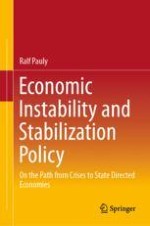
2021 | OriginalPaper | Chapter
1. Introduction: Views on Economic Crises in the Twenty-First Century
Author : Ralf Pauly
Published in: Economic Instability and Stabilization Policy
Publisher: Springer Fachmedien Wiesbaden
Activate our intelligent search to find suitable subject content or patents.
Select sections of text to find matching patents with Artificial Intelligence. powered by
Select sections of text to find additional relevant content using AI-assisted search. powered by